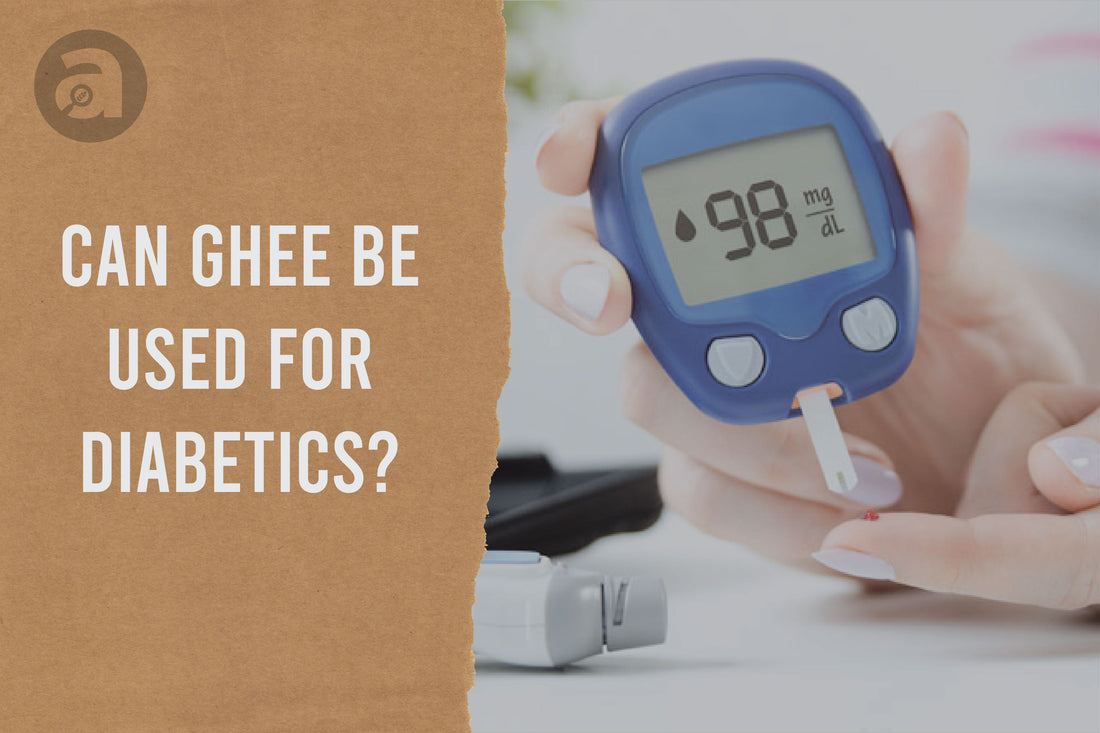Around 30 million people in India suffer from diabetes type 1 or type 2, with the urban Crude Prevalence Rate (CPR) close to 10% and an Impaired Glucose Tolerance (IGT) of around 9%. Managing diabetes is tricky because you tend to question all your food choices. One of the myths surrounding the diabetic diet plan is that desi ghee is harmful and hence should be avoided. In reality, nutritionists support the intake of ghee in small amounts daily.
What is Diabetes?

Insulin is a crucial hormone secreted by the Islets of Langerhans in the pancreas, more precisely by the beta cells. Its function is to reduce the blood glucose levels and foster glucose stored in adipose tissues, muscle and liver.
When the beta cells either completely stop secreting insulin or they produce a reduced amount. This condition when the pancreas stops working efficiently and does not make enough insulin is called diabetes mellitus. When our body’s immune system attacks the beta cells of the Islets of Langerhans resulting in no insulin secretion, Type 1 diabetes mellitus is caused. Type 2 diabetes mellitus is caused when the body is no longer able to produce or respond to insulin.
Is ghee good for diabetics?

People with diabetes have to be very careful regarding what they eat as the food directly affects the blood sugar levels. The use of oils and ghee by diabetic people has always been a topic of discussion. Dieticians advocate that ghee is medicine for diabetic people. Ghee, especially Vedic ghee from cow’s milk is proven to balance blood sugar level as the fatty acids present in it aids in glucose metabolism.
Ghee is rich in linolenic acid which reduces the chances of acquiring cardiovascular disease. Other benefits of eating ghee is it ensures a healthy and smooth gut. The vitamins (A, D and K), butyric acid and antioxidants present in ghee help boost immunity, which is generally weakened in diabetics.
Effect of ghee on the Glycemic Index (GI) of food
The glycemic index of any food item is a measure of how rapidly it causes our blood sugar levels to rise. It ranges from 0 to 100. High glycemic index foods (processed carbohydrate and processed sugar) get digested and absorbed quickly, leading to an increase in the blood sugar level.
On the other hand, food items rich in fibre, protein or fat raise the sugar level rather gradually and hence have a low GI value. Ghee is amongst one of these. The omega-3 fatty acids and antioxidants in ghee help in maintaining cardiac and neural health, and increase the count of healthy bacteria in the gut and stomach. This leads to increased immunity as well.
Adding ghee to food reduces its glycemic index, which in turn helps regulate your blood sugar levels. So instead of making you obese, ghee helps shed fat and lose weight naturally!
Does ghee cause insulin spike?
No, ghee does not cause a spike in the insulin level. Ghee contains healthy fats which even lower the glycemic index of high carbohydrate food items and aid in their digestion and absorption
Desi cow ghee helps in reducing cholesterol too.
How to use ghee for diabetes?
Although it is strongly suggested that you consult your doctor for the exact amount, you can always add a teaspoon of ghee to dal, rice, khichdi or rotis as ghee helps in the digestion of these carbohydrate-rich foods. Make desi cow ghee made by Vedic process a part of your daily diet instead of oils. The essential thing to keep in mind is that you should consume good quality ghee in limited amounts to reap maximum benefits.



